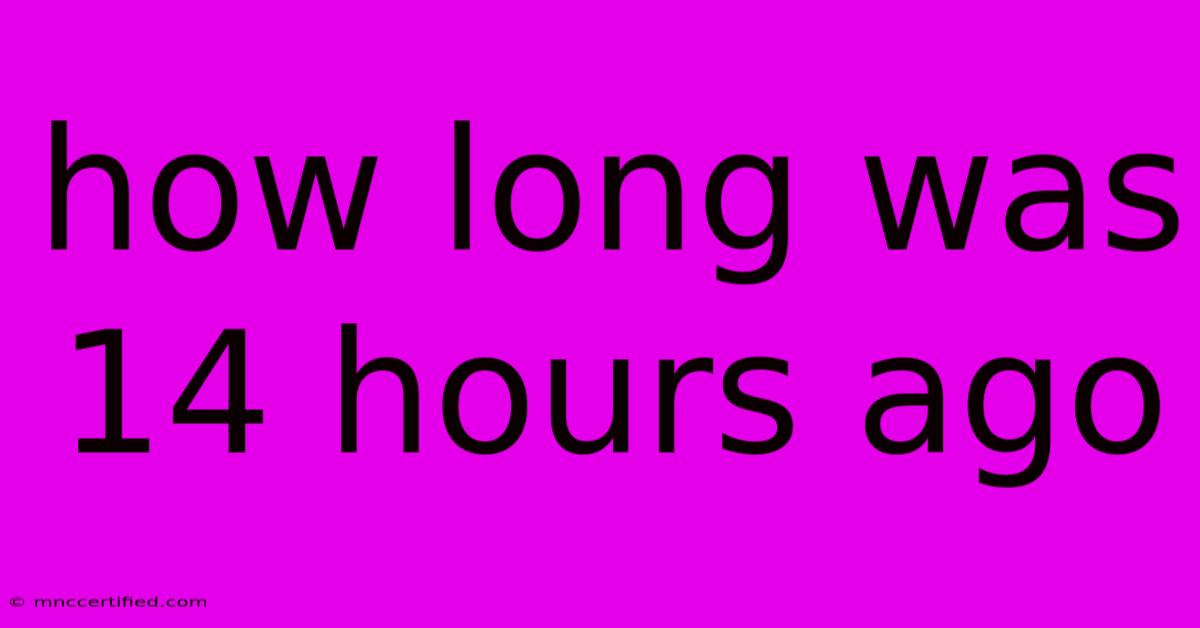How Long Was 14 Hours Ago

Table of Contents
How Long Was 14 Hours Ago? A Simple Guide to Time Calculation
Figuring out what time it was 14 hours ago might seem straightforward, but it can be surprisingly tricky depending on the time zone and the specific context. This comprehensive guide will walk you through several methods to accurately determine the time 14 hours prior, addressing potential complications and offering helpful tips.
Understanding the Basics of Time Calculation
Before diving into the specifics of calculating 14 hours ago, let's establish a foundational understanding. Time is relative and depends heavily on your current time zone. A simple subtraction of 14 hours from your current time will only work if you're not considering any time zone changes.
Factors Affecting Time Calculation
- Your Current Time: The starting point for any calculation. Be precise!
- Time Zone: Crucial for accurate results. A time difference of 14 hours could easily span across multiple time zones.
- Daylight Saving Time (DST): Remember to account for DST changes, as they shift the clock forward or backward by an hour. This is a common source of error.
Methods for Calculating 14 Hours Ago
Here are several ways to determine the time 14 hours ago, ranging from simple mental math to using online tools:
1. Manual Calculation (With Consideration for Time Zones and DST)
This method requires careful attention to detail.
- Note your current time and time zone. Be precise, noting AM or PM.
- Subtract 14 hours: Start by subtracting 12 hours (this often moves you to the previous midday period). Then subtract the remaining 2 hours.
- Adjust for DST: If your location has observed daylight savings time in the past 14 hours, adjust accordingly. If you've gone into or out of daylight saving time, add or subtract an hour respectively.
- Account for Date Changes: If your subtraction results in a negative time (e.g., -2:00 AM), you've moved to the previous day.
Example: Let's say it's currently 6:00 PM PST on October 26th, and we're not in DST. Subtracting 14 hours results in 4:00 AM on October 26th (6 PM - 12 hours = 6 AM, 6 AM - 2 hours = 4 AM).
Caution: This method is prone to errors if not executed meticulously.
2. Using a World Clock or Time Zone Converter
Numerous online resources provide world clock tools and time zone converters. These are invaluable for accurately calculating time differences across zones.
- Find a reputable world clock website. Many websites offer free services.
- Input your current time and time zone.
- Subtract 14 hours. The website should automatically adjust for DST if necessary.
3. Using a Digital Calendar or Smartphone
Most digital calendars and smartphones have built-in time calculation features.
- Open your calendar or clock app.
- Use the time-shifting functionality. Look for options to add or subtract hours. Some calendars let you jump directly to a specific time.
Avoiding Common Mistakes
- Ignoring time zones: This is the most frequent error. Always consider the time zone where you want to determine the time 14 hours ago.
- Neglecting DST: Failure to account for Daylight Saving Time will result in inaccurate calculations.
- Rushing the calculation: Take your time and double-check your work.
Conclusion: Accuracy is Key
Determining the time 14 hours ago requires precise attention to detail. While manual calculation is possible, using online tools or digital calendars significantly reduces the risk of errors, particularly when crossing time zones or accounting for DST. Choose the method that best suits your needs and always double-check your results for accuracy. Remember to carefully consider your current time, time zone, and any relevant DST changes to ensure you get the correct answer.

Thank you for visiting our website wich cover about How Long Was 14 Hours Ago. We hope the information provided has been useful to you. Feel free to contact us if you have any questions or need further assistance. See you next time and dont miss to bookmark.
Featured Posts
-
Trumps Departure From Rnc Fuels Senate Rumors
Dec 10, 2024
-
Moore And Moore Insurance
Dec 10, 2024
-
New 28 Days Later Trailer Zombie Cast
Dec 10, 2024
-
Matchday 6 Ucl Team News And Lineups
Dec 10, 2024
-
Lawsuit Targets Jay Z Child Rape Claim
Dec 10, 2024